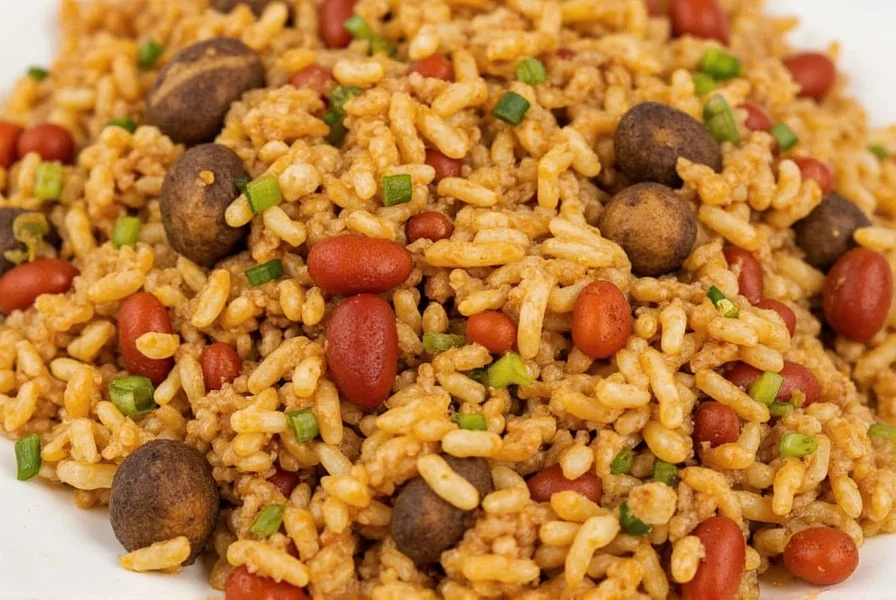Table of Contents
Introduction to Jambalaya Mix
If you're a fan of bold, spicy, and richly flavored dishes, then jambalaya mix is something you should know about. This pre-mixed blend of spices and seasonings is designed to bring the authentic taste of traditional jambalaya to your kitchen with minimal effort. Whether you're an amateur cook or a seasoned pro, understanding what goes into a good jambalaya mix can elevate your cooking game and make your meals more flavorful.
But wait—what exactly is jambalaya mix? It's a convenient way to get all the essential spices needed for a classic Creole or Cajun dish without having to measure each one individually. From paprika to cayenne, garlic powder, onion powder, and even thyme, these mixes are packed with flavor. The best part? They’re easy to use and perfect for quick weeknight dinners or big family gatherings.
Spice Basics: What You Need to Know
To truly appreciate jambalaya mix, it helps to understand the individual spices that make up the blend. Let’s break down the key components:
- Paprika: Adds color and a sweet, smoky flavor.
- Cayenne Pepper: Provides heat and spice.
- Garlic Powder: Adds depth and umami.
- Onion Powder: Enhances the savory notes.
- Thyme: Offers a subtle herbal aroma.
- Oregano: Brings a slightly bitter, earthy flavor.
These ingredients work together to create a balanced, complex flavor profile. But not all jambalaya mixes are created equal. Some may have more heat, others might be more aromatic or sweet. That’s where the buying guide comes in handy.
Practical Tips for Using Jambalaya Mix
Using jambalaya mix doesn’t mean you can just throw it into a pot and call it a day. Here are some tips to help you make the most of this spice blend:
- Start with the right ratio: Follow the package instructions, but don't be afraid to adjust based on your taste. A little goes a long way!
- Use fresh ingredients: Jambalaya mix enhances the flavor of your base ingredients, so make sure you're using quality rice, meat (like chicken or sausage), and vegetables.
- Don't skip the liquid: The mixture needs enough broth or water to cook properly. Aim for a 2:1 ratio of liquid to rice.
- Let it rest: After cooking, let the jambalaya sit for a few minutes before serving. This allows the flavors to meld and the texture to settle.
- Experiment with variations: Try adding different proteins like shrimp or crawfish, or swap out the rice for quinoa or cauliflower for a healthier twist.
Pro tip: If you want a spicier version, add extra cayenne pepper or hot sauce. For a milder version, reduce the amount of chili powder or omit it entirely.

Buying Guide: How to Choose the Right Jambalaya Mix
With so many brands on the market, choosing the right jambalaya mix can be overwhelming. Here are some factors to consider when making your purchase:
- Flavor Profile: Look for a mix that balances heat, sweetness, and savoriness. Some blends are more smoky, while others are more herbal.
- Ingredients: Check the label for natural, high-quality ingredients. Avoid mixes with excessive fillers or artificial preservatives.
- Heat Level: Decide how spicy you want your jambalaya to be. Some mixes are mild, while others pack a serious punch.
- Brand Reputation: Choose a brand known for quality and consistency. Popular options include Zatarain’s, Stubb’s, and Louisiana.
Here’s a breakdown of a few popular jambalaya mixes:
Popular Jambalaya Mix Brands
| Brand | Features | Best For | Occasions |
|---|---|---|---|
| Zatarain’s | Classic Creole blend with a good balance of heat and flavor | Traditionalists who prefer a well-rounded taste | Family dinners, holiday meals |
| Stubb’s | Smoky, bold, and slightly sweet | Those who love a stronger, more intense flavor | BBQ events, weekend get-togethers |
| Louisiana | More peppery and less sweet than others | Cooking enthusiasts who enjoy experimenting with spice levels | Custom recipes, gourmet dishes |
The right jambalaya mix can transform your dish from average to unforgettable. Whether you're cooking for a crowd or just yourself, finding the perfect blend will make your meal stand out.
Comparison Table: Popular Jambalaya Mix Brands
Here’s a quick comparison to help you choose the best jambalaya mix for your needs:
| Feature | Zatarain’s | Stubb’s | Louisiana |
|---|---|---|---|
| Flavor Profile | Well-balanced, sweet and spicy | Smoky, bold, slightly sweet | Peppery, less sweet |
| Heat Level | Moderate | High | Medium |
| Ingredients | Natural spices, no artificial additives | Contains natural and artificial flavors | Minimalist, focused on pepper and paprika |
| Best For | Traditional Creole-style jambalaya | Strong, bold flavor lovers | Cooking enthusiasts who like control over spice |
This table gives you a snapshot of what each brand offers. Remember, the best mix is the one that matches your personal taste and cooking style.
Conclusion
In conclusion, jambalaya mix is more than just a convenience item—it's a gateway to authentic, flavorful Creole cuisine. Whether you're a spice enthusiast or a busy professional looking for a quick meal, understanding the basics of jambalaya mix and how to use it effectively can make a world of difference in your cooking.
From its rich history to its modern-day popularity, jambalaya mix continues to bring people together around the table. So next time you’re craving something bold, spicy, and satisfying, reach for a bag of jambalaya mix and let the flavor take center stage.
And remember, the journey of spice is never-ending—keep experimenting, keep tasting, and most importantly, keep enjoying the delicious world of flavor.










 浙公网安备
33010002000092号
浙公网安备
33010002000092号 浙B2-20120091-4
浙B2-20120091-4